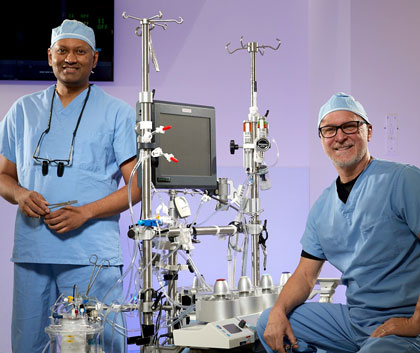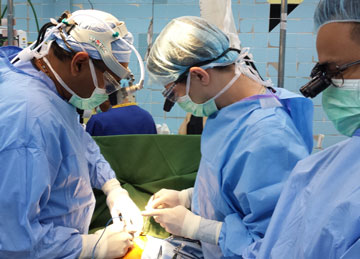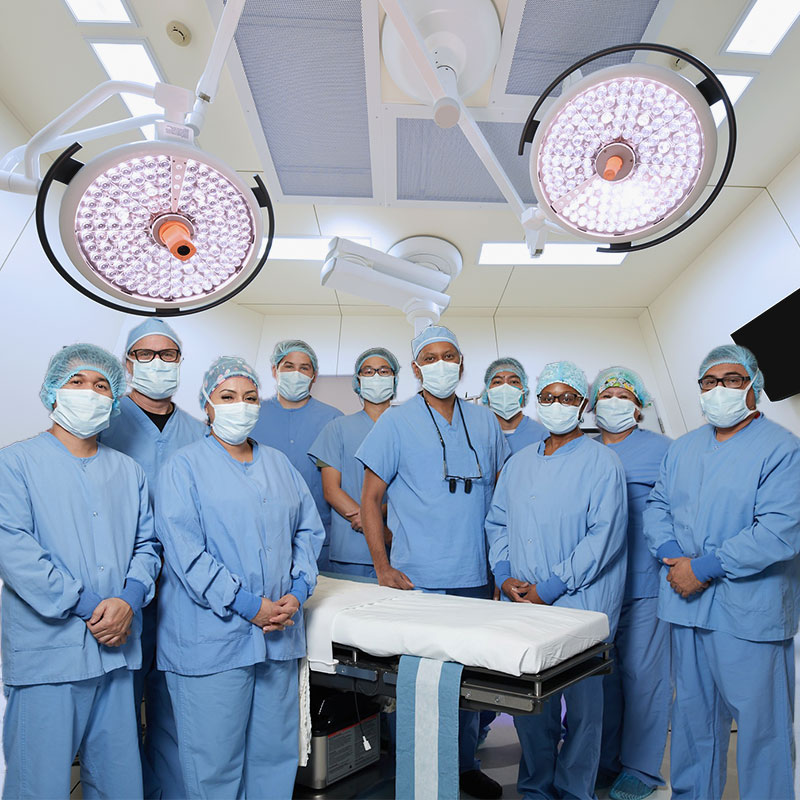We are one of only a few hospitals in Southern California to offer comprehensive congenital cardiac care to patients of all ages. Our expert team of board-certified specialists includes a congenital cardiac surgeon, critical care physicians, pediatric and adult cardiologists, advance practice nurses, perfusionists, anesthesiologists, pharmacists and critical care nursing staff.
We partner with the renowned MemorialCare Heart & Vascular Institute at Long Beach Medical Center to offer the latest in congenital cardiac surgical techniques. Because we are connected, this powerful alliance enables us to assemble a uniquely specialized team of professionals to perform surgery on patients of all ages; from the tiniest newborn, to a transitioning adolescent, through adulthood.
Highly Personalized Care
 From birth through adulthood, patients with congenital heart defects need highly specialized care not offered at most hospitals. We treat virtually every type of congenital heart defect, offering the latest interventional and treatment options -- under one roof, in one location, one heart at a time.
From birth through adulthood, patients with congenital heart defects need highly specialized care not offered at most hospitals. We treat virtually every type of congenital heart defect, offering the latest interventional and treatment options -- under one roof, in one location, one heart at a time.
We understand that caring for our patients means taking care of our patients and their family. Our approach is simple: to provide personalized care that is tailored to meet the needs for the individual patient and their family. The Children’s Heart Institute provides a continued care throughout the surgical experience from preoperative evaluation and education, through the operation and intensive care admission and into the post-operative period. We use this family-centered care approach to make the overall hospital experience as seamless as possible.
We provide outstanding post-operative care in the Cardiothoracic Intensive Care Unit and extensive follow-up care plans are handled in the Outpatient Specialty Centers to ensure that each patient’s individualized needs are met.
Congenital Heart Defects
 A congenital heart defect is an abnormality in a person’s heart structure that they’re born with. They are America’s most common type of birth defect. They can involve the walls and valves of the heart, and the arteries and veins near the heart. Some defects can disrupt the normal flow of blood through the heart and throughout the body.
A congenital heart defect is an abnormality in a person’s heart structure that they’re born with. They are America’s most common type of birth defect. They can involve the walls and valves of the heart, and the arteries and veins near the heart. Some defects can disrupt the normal flow of blood through the heart and throughout the body.
Learn more about the types of congenital heart defects we treat.
Our Pediatric & Adult Congenital Cardiac Surgery Program can treat adults, at any age, who have discovered later in life that they have a congenital heart defect or have complications from previous treatment.
There are more than 750,000 adults living with a congenital heart defect in the United States. This could be because many adults with congenital heart disease may not be getting proper follow-up care after correctional surgery they had when they were a child, or they were misdiagnosed when they were younger because they never showed any symptoms.
There are several reasons as to why congenital heart defects come back into the lives of some adults. In some cases, treatment received in childhood may have been successful, but as the heart grows and develops the structures may change causing the original defect to resurface. With the complexity of the repairs performed today in infants, lifelong surveillance is needed in these patients. It's also possible that heart problems weren't caught or serious enough to repair during childhood, but have now worsened and require treatment.
We partner with the renowned MemorialCare Heart & Vascular Institute at Long Beach Medical Center to offer the latest in congenital cardiac surgical techniques.
- Coarctation of Aorta
- Epicardial Pacemaker Placement
- Interrupted Aortic Arch
- Intra/Extra Cardiac Tumor Resections
- Adult Congenital Surgery (Pulmonary Valve Replacements, Sinus Venosus ASD, ASD, VSD, etc.)
- Anomalous Coronary Arteries
- Aortopulmonary Window Surgery
- Arterial Anomalies
- Atrioventricular Septal Defects
- Complex Single Ventricular Anomalies (Tricuspid Atresia, Mitral Atresia, etc.)
- Diaphragm Plications
- Double Outlet Right Ventricle
- Extracorporeal Membranous Oxygenation (ECMO for Cardiac Collapse)
- Left/Right Ventricular Outflow Tract Obstruction
- Tetralogy of Fallot
- Mediastinal Surgery (Thymus, Tumor Resection)
- Patent Ductus Arteriosus
- Pericardial Surgery (Effusion Drainage, Biopsy)
- Pulmonary Atresia
- Transposition of Great Arteries
- Truncus Arteriosus
- Valvular Surgery
- Vascular Rings
- VATS Pulmonary Biopsies/Pleurodesis/etc.
- Venous Anomalies
- TAPVR
- PAPVR
- Cor Triatratum
Learn more about pediatric and adult congenital heart diseases.
We understand that caring for our patients means taking good care of their family as well. Our approach to pediatric surgery is simple: to provide personalized care that is tailored to meet the needs of the individual patient and their family. Our goal is to provide attentive and family centered care, and to make the overall hospital experience as seamless and pain-free as possible.
- Meet your surgeon and care team prior to surgery – Let the team explain things in a way you will understand, and have a chance to get all your questions answered. This is the same team that will be taking care of you throughout your hospital stay.
- Take a tour before surgery – Join our Cherese Mari Laulhere Child Life Program to meet some friendly faces, and familiarize yourself with your new surroundings. There is so much to do on the morning of your child’s surgery; it is often helpful to learn about the process ahead of time.
- Individualized nursing – After surgery you will be provided with one-on-one nursing care by a specially trained cardiac care professional nurse. This extra touch allows them to provide a little extra time to be especially attentive, explain things, and answer questions.
- No moving around the hospital – Your child will remain in our acuity-adaptable Cardiothoracic Intensive Care Unit during the entire hospital stay. No moving around the hospital means less stress and a more peaceful and uninterrupted recovery, both for your child and your family.
- Support and guidance all the way home – As your child recovers, you will meet many team members that will support and assist you in the process of transitioning your child home. Our professional nursing staff will prepare you to care for your child’s continued recovery after discharge. Our team of expert discharge planners and dietitians will interface with providers to arrange for services and equipment you may need.

